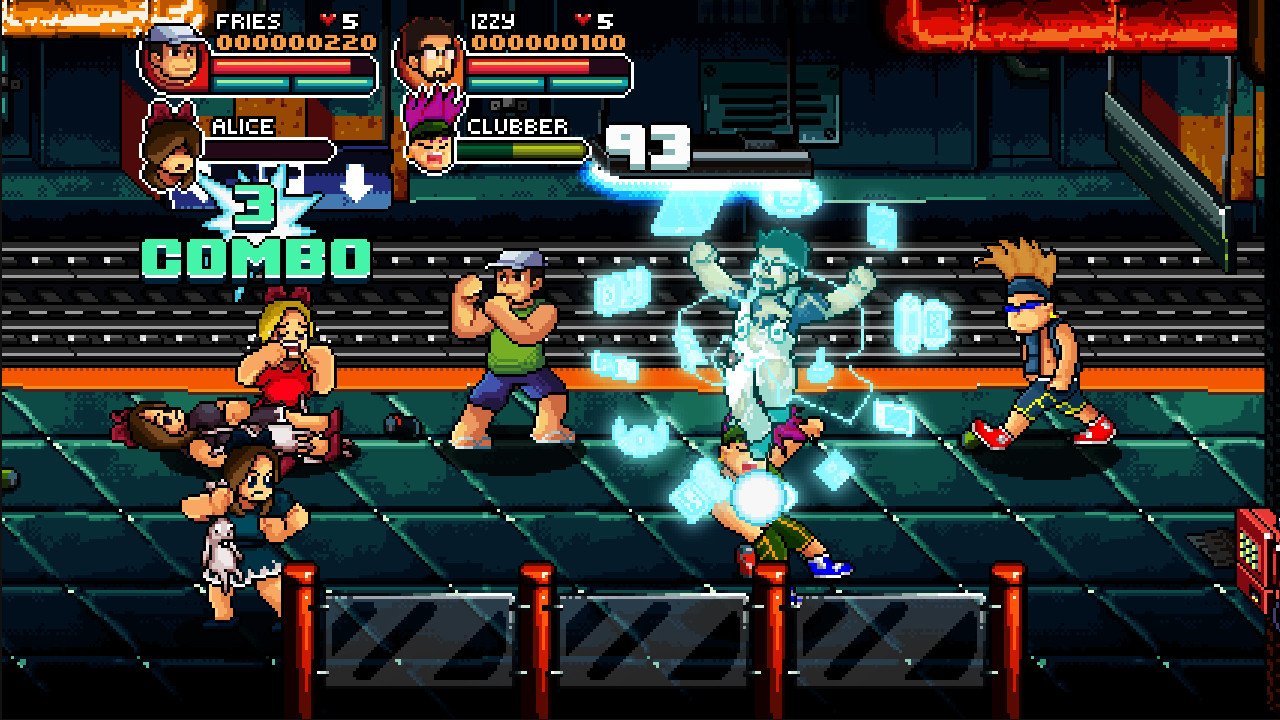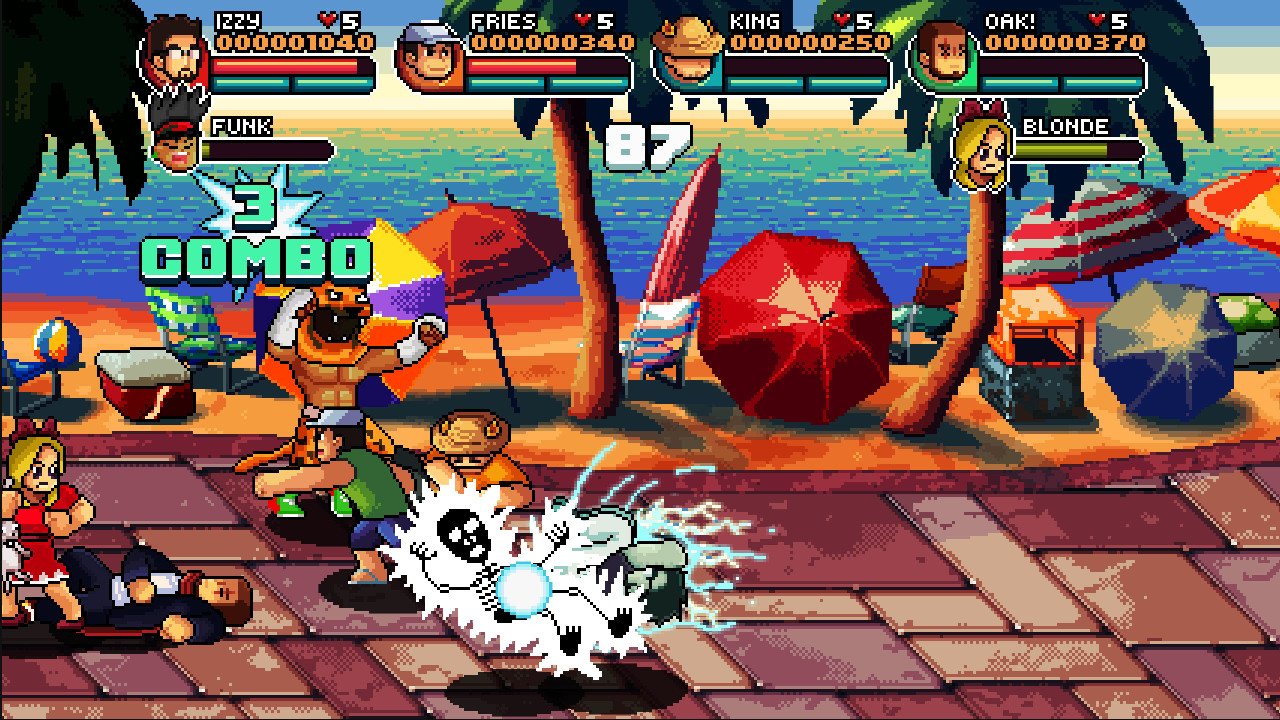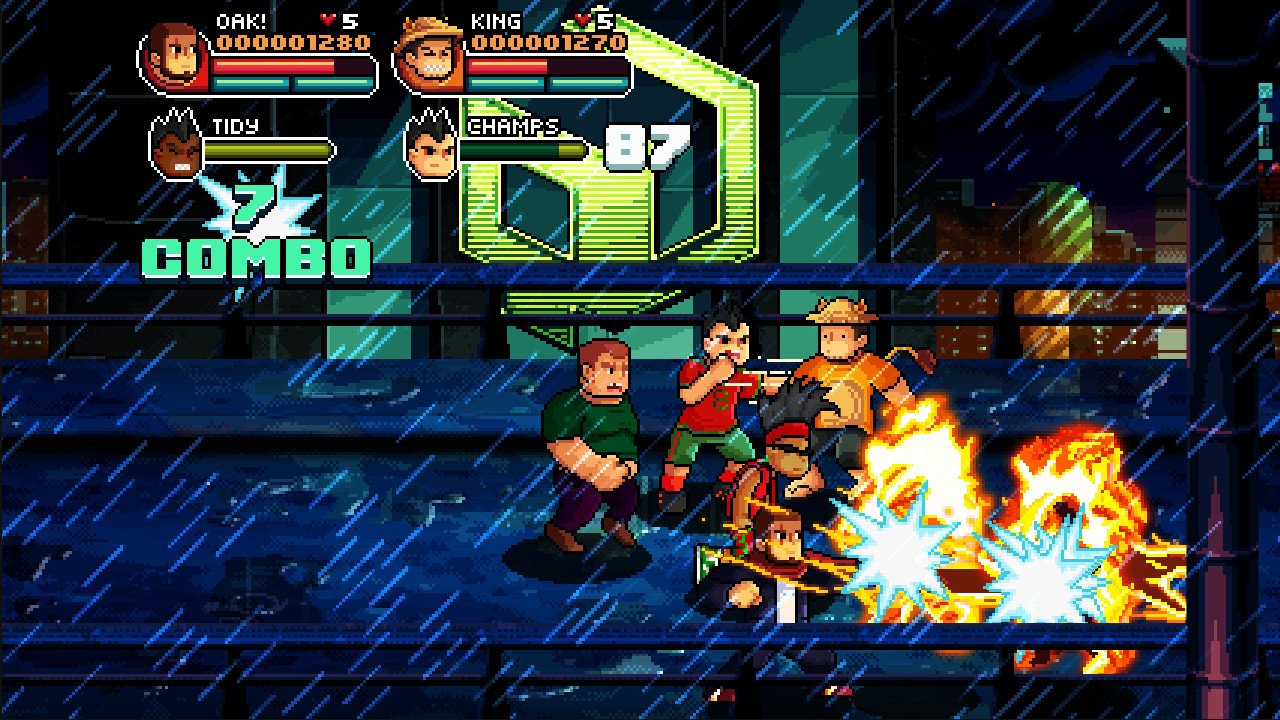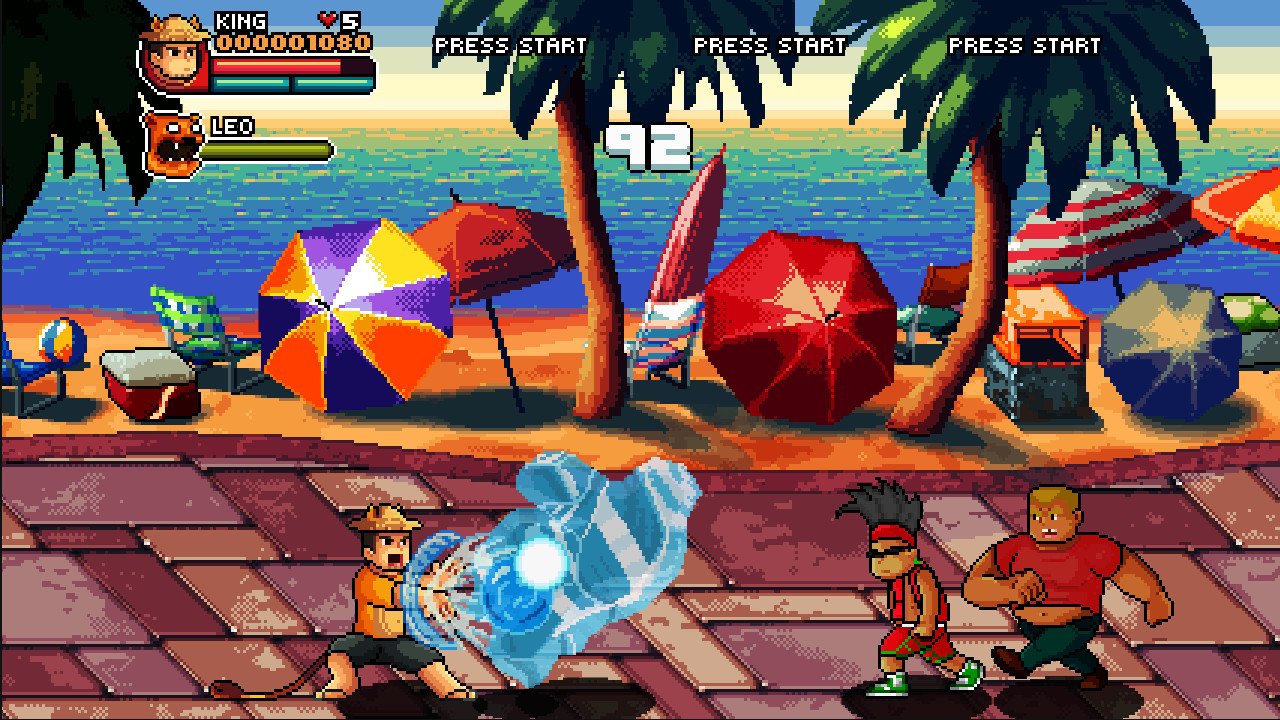99Vidas Review
Energetic, Enthusiastic, Ephemeral
As a tribute to the punchy beat ‘em ups that circulated the arcade across the eighties and nineties, that 99Vidas is every bit as overblown as its coin-operated influencers isn’t much of a surprise, but after the thrills of familiarity inevitably run dry, it soon becomes apparent that there isn’t much on offer beyond an assortment of fond 16-bit memories.

Granted, that’s not entirely a negative thing. The story kicks off after the 99Vidas - a legendary source of supreme power - is purloined by a megalomaniacal ‘Boss’, who seeks to dominate society with an army of cosplay-enthused goons. As such, it’s your job as one of eleven ‘Guardians’ to reacquire the exalted Vidas, and thereby save civilisation. Campy, energetic, and ever so slightly ridiculous, the admiration 99Vidas has for its past is obvious, and if you grew up alongside the bombastic plots of Golden Axe or Streets of Rage, it’s likely you’ll find much recognisable in 99Vidas’ pulpy premise.
The visuals mostly present a mixture of eighties-to-nineties pop culture and the hallmark beat ‘em ups of the era, with Double Dragon and Streets of Rage amongst the more potent aesthetic influences. For example, an early boss character vaguely imitates Double Dragon’s Abobo, while the shadowy city skylines and grungy video stores blend the 16-bit backdrops of Streets of Rage with a dewy-eyed remembrance of arcade culture, as a chippy, full-on soundtrack rethreads the familiar beats laid down in Final Fight.
Sound elsewhere is less appealing. In fact, it regularly surpasses into discomfort by way of a shouty DualShock. Each time health is replenished or lives are lost, celebratory (or consolatory) stock phrases are belted out through the DualShock speaker at near-assaultive volumes. What’s worse is that it’s the same phrase every time, and due to the inability to turn the speaker down, it doesn’t take long to become prime headache material.
The Boss’ band of henchman is comprised seemingly of arcade references and character tropes borne from the late 80’s and early 90’s, and continually rib the game’s self-awareness through an increasingly ludicrous script. The meaty bravado sequence preceding each of the game’s boss fights make it obvious they’re playing dress-up: from a Bigfoot-impersonating fishing enthusiast, to a middle-aged dragon cosplayer whose onesie is a touch too short, 99Vidas performs much of the nostalgia it hopes to summon in its players. That 99Vidas largely replicates old-school beat ‘em uppery will likely already strike attractive to those nostalgic for the genre, but including its characters as participants in that nostalgia strangely prevents minibosses feeling tired; fighting those are trying to be big n’ tough strikes both fresher and funnier than it could’ve been fighting those who really are. Other enemies, such as the slide-tackling footballers and neon-haired dinner ladies, feel a touch generic in comparison, but the absurdity underpinning each culminating showdown was usually enough to keep me interested in seeing each stage through.

Instead, the problem surrounds more how fights play than their visual panache. As might be expected of its throwback nature, 99Vidas prioritises the straightforward combo-busting acclaimed in its predecessors, while ensuring the designs, mechanics and control schemes of years past resurface similarly untouched.
After selecting your Guardian of choice, you travel throughout several themes stages, tackling cyborgs and thugs galore in single-screen combat. Like Streets of Rage, speed and strength make up the core values of all eleven playable guardians, with the balance tipping between the two according to whom you choose. Each guardian also has a special ability that aligns with the element they represent. The overall-sporting Izzy, for example, can rain lightning down from the heavens, while King - a cartoon-loving lion cosplayer - can summon a water goddess to wash an icy torrent over enemies. Unfortunately, you’ll mostly be resorting to the same run-punch-kick combos regardless of who you choose, and though special abilities offer minor aesthetic quirks that are interesting to look at, they’re quickly exhausted and aren’t particularly useful during more populated stages.
As with Double Dragon and Final Fight, hit boxes are noticeably precise; requiring near-perfect alignment in order for strikes to count. If they don’t, you’ll most likely become caught in a hefty enemy combo; something that - given they can easily halve your health - might appear more aggravating to those less fond of timeworn control schemes.
Registering hits is made considerably more challenging by the fact enemies are almost twice as fast as you are. Many waves consisted mostly of chasing enemies around, only to be caught out by a flurry of strikes when they finally stopped. Again, the swift reflexes and unwavering vigilance this requires may likely appeal to lovers of 90’s coin-ops, but as a current-gen brawler, that’s a pretty exclusive audience.

Piece by piece, the grinningly referential tone of 99Vidas peels away to reveal a veritable host of inconsistencies. Amongst the more noticeable of such is the difficulty. Not that I’m criticising difficulty alone, but the challenge curve appears so oddly paced that stages can err on frustration. While the first three stages knit together nicely, later levels can feel impenetrable, with the pivotal Big Bad taking it to such an extreme that deaths almost read off as cheap.
It’s also a shame that some enemies appear more interested in wandering off-screen than really engaging in combat, which meant I frequently found myself huddled in the corner of the screen having pursued them. A relatively minor gripe, given you can always lure them back by backtracking, but I did sometimes feel as if I wasn’t making ‘full use’ of the game’s wonderful environments. Of course, as a classic-style beat ‘em up, I suppose the emphasis shouldn’t necessarily be on gawking at the furniture, but without its distinctive love for pop culture on both local and mainstream levels, 99Vidas would just be another – quite dull - 'retro sidescroller'.
Another oddity arises within the game’s attempts to offer support between waves. I’d stumble across health boosters and pickups during the earlier parts of a stage (which were fairly redundant, given my health hadn’t depleted much), only to find myself swathed with stampedes, thugs and leopard-headed footie mascots moments later with nary a top up in sight. The lack of balance soon becomes frustrating, especially because the tendency towards group encounters make it difficult to avoid getting caught in devastating enemy combos.
This said, 99Vidas makes its co-op intentions plain from its opening menu, which possibly explains why stages can feel overwhelming when playing alone. There are attempts to remedy this with the lighter ‘Izzy’ mode, however, so if super-precise hit boxes and scarce health boosts strike you as more frustrating than challenging, that’s perhaps the way to go if you’d just like to experience the story.

While the inclusion of network features appears in theory a nifty modern addition, the multiplayer scene for 99Vidas appears so unfortunately quiet that it’s difficult to assemble a team online, so you’ll likely need to organise a couch day if you want to play 99Vidas as it was intended. Admittedly, playing in local co-op greatly removes much of the chaos (by extension, the difficulty) belying standard stages, making it easily blustered through in a couple of hours.
In terms of narrative and tone, 99Vidas appears a delightful tribute to the old-school beat ‘em up, but very rarely does the gameplay itself diverge from the run-punch fare of its arcade influencers. As it stands, if you’re looking to re-experience arcade brawlerdom without bejangling your pockets with quarters, 99Vidas will probably give you the kick you want, but with a breakneck playing length and little incentive to return, a ‘kick’ will likely be all you get.
 Comments
Comments











